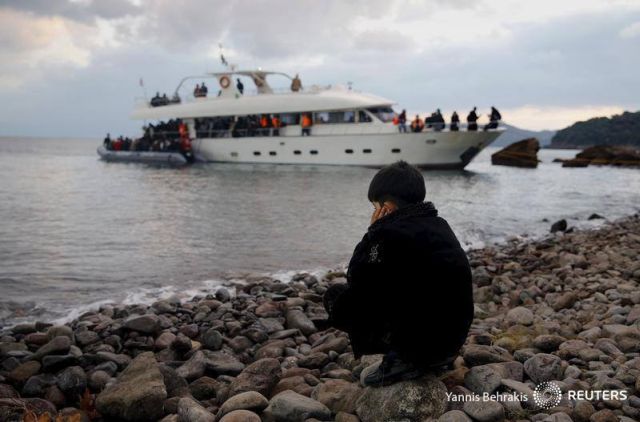Photo: www.tovima.gr
It has been several days since the emergency medical centre in Skala Sikamia, on the island of Lesbos, opened its doors. Skala Sikamia is one of the key points, through which refugees and immigrants have been streaming in on the island. The chief of the emergency department at the Rio-Patras University Hospital, Andreas Iliadis, who leads this initiative, says "a great deal of urgent and serious cases arrive here. The emergency centre will be very useful in dealing precisely with these kind of cases. When you have a hypothermic child in your hands, sending him or her to hospital can be fatal. The initiative is entirely voluntary-based, but it gets technical support from the University of Patras. For the time being, we have managed to put together a small medical centre for emergencies. Based on donations, we're trying to upgrade it to a small intensive care unit with the capacity to offer immediate assistance to two adults and two children."
The medical centre was set up by volunteering medical professionals inside the premises of the old Skala Sikamia hospital. It has already had its first serious case of providing first aid to a refugee with severe asthma.
Andreas Iliadis also calls upon physicians, who are specialized in emergencies and are willing to help as volunteers at the emergency Skala Sikamia centre, to contact either the Physicians' Association of Lesbos, or call tel. 6944 629 872.
As the chairman of the Achaia Hospital Doctors Union, Thassos Yakoumis, points out, the idea to create a centre was born after a solidarity mission involving doctors from Achaia as well as Greeks of Syrian origin.
"We tried to contact the authorities of the island to ask where we could help the most, and found that there is no central coordination of NGOs and volunteers working on the island. There is no authority even to provide a modicum of coordination to those who are willing to help and offer their services as volunteers. Andreas Iliadis, who was with us, found that the big issue was the provision of emergency assistance, the shortage of which was costing lives: the Mytilene hospital is at least an hour and a half from where the refugees come ashore. Hence his decision to set up an emergency centre. We managed to convince the local authorities to give us the old local hospital building to house the centre", Tassos Yakoumis explains.

Lack of coordination
The lack of any coordination has been highlighted by both health authorities and volunteers on Lesbos. There is a danger in providing medical assistance to immigrants and refugees by a number of NGOs, which arrived on the island without proper certification. Some of these organisations operate without any control mainly in the northern part of Lesbos, from Molivos and Efthalou to Sikamia, and even hamper the access of licensed bodies or work in makeshift facilities that fail to offer any qualified help.
"Personally, I do not share this opinion about the work of NGOs," says Michalis Chadziyannis, head of the National Primary Health Network in Mytilene. "But I'm sure that there is no coordination whatsoever between NGOs and public bodies on the island. Let me give the big wreck on 28 October as an example. We, at the National Network, were prepared and we had warned all our medical staff to stand at the ready. I do not know on whose orders, but almost all cases were whisked to the hospital, which resulted in chaos, while we could have handled most cases. "
As Michalis Hadziyannis points out, there is no official reporting by NGOs working on the island. No one knows how many of them are functioning, what their membership is like, or what qualifications their members have.
"The Physicians Union is the only organisation in charge of certifying doctors and NGOs working as health providers at present. Yet, despite our appeals, only Doctors of the World got their members certified to work this on the island. We made two calls to those offering health services to come to our union and get a certificate as doctors, so that we might know where we could use them if necessary", said Panagiotis Provendzas, President of the Lesbos Physicians Union before radio Aegeo. "We have been warned that organisations, the members of which are not even doctors, are providing care, and there is no control whatsoever. Some doctors at the hospital have given reports of people who accompany refugees claiming to be doctors and interfering in our work. We no longer know where to turn, the problem is serious," he adds.
The fact is that medical care on the island is insufficient not only because of the refugee problem, but even in terms of meeting local demand. Staff was reduced by 30% and overtime is not paid. The National Emergency Centre has been working beyond its capacity, and the presence of medical organisations on the island could be really useful as long as there is coordination and control over their activities. The presence of most of these organisations helps in tackling issues that neither the island nor the volunteers can cope with, but better coordination is a prerequisite as even the best of intentions can have adverse consequences.